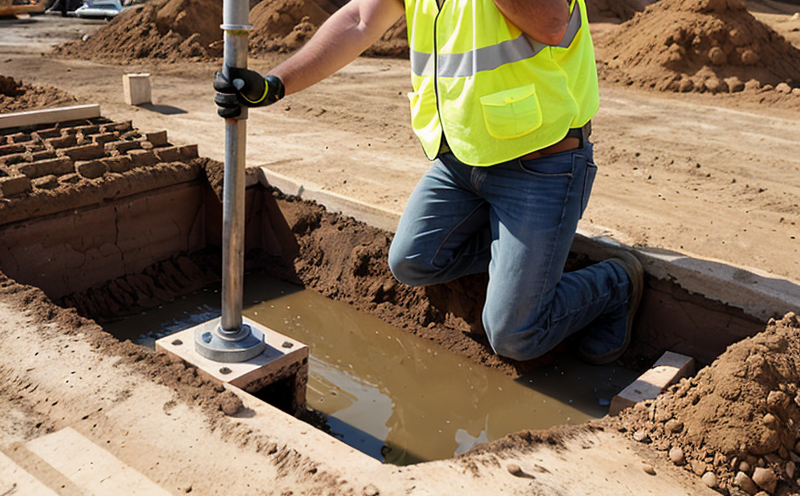ISO 17892-6 Shear Strength Testing of Soils
The ISO 17892-6 standard specifies a method for determining the shear strength of soils using triaxial compression tests. This service is essential in geotechnical engineering to assess the stability and load-bearing capacity of soil layers supporting structures such as buildings, bridges, and other infrastructure projects.
Shear strength testing helps identify the maximum stress that can be applied to a material before it fails by shearing. In the context of soils, this is critical for predicting how these materials will behave under various loading conditions. The test results are used in designing foundations, retaining walls, and other structures where soil stability is paramount.
The ISO 17892-6 procedure involves preparing cylindrical specimens from undisturbed or remolded soil samples. Specimens are then placed into a triaxial cell, where they undergo controlled compression until failure occurs. The shear strength can be determined by measuring the maximum load at failure and the corresponding strain.
Understanding the shear strength of soils is crucial for ensuring structural integrity and preventing potential failures such as landslides or settlement issues. This service supports compliance with international standards, enhancing project safety and sustainability. Our laboratory uses state-of-the-art equipment to ensure accurate and reliable results.
The process begins with collecting soil samples from the site of interest. These samples are then processed according to ISO 17892-6 guidelines to prepare the specimens for testing. The triaxial cell simulates in-situ stress conditions, providing a more realistic assessment of the material's behavior.
During the test, precise instrumentation measures both axial and radial stresses as well as strain. This data is used to calculate the effective shear strength parameters, including cohesion and angle of internal friction. These parameters are key indicators of soil stability and form the basis for design calculations.
The results of ISO 17892-6 tests are critical inputs into geotechnical design processes. They inform decisions on foundation sizing, retaining wall design, and other structural components that interact with the ground. By accurately determining shear strength, we help clients avoid costly rework and ensure compliance with international standards.
Our experienced staff ensures each test adheres strictly to ISO 17892-6 protocols, enhancing credibility and trustworthiness in our results. We provide detailed reports that include all relevant data points and interpretations necessary for informed decision-making by engineers and project managers.
The importance of shear strength testing cannot be overstated in the construction industry. Accurate assessments are vital to ensure long-term performance and safety of structures. By leveraging this service, our clients gain a competitive edge in delivering high-quality projects that meet or exceed regulatory requirements.
Applied Standards
| Standard | Description |
|---|---|
| ISO 17892-6 | Determination of shear strength of soils using triaxial compression tests. |
Quality and Reliability Assurance
We adhere to strict quality control procedures to ensure the reliability of all test results. Our laboratory follows ISO 17892-6 guidelines meticulously, employing calibrated equipment and trained personnel. Regular calibration checks and proficiency testing further enhance our accuracy.
Our commitment to excellence is reflected in our meticulous sample preparation processes and rigorous data analysis techniques. We employ advanced software tools for post-test interpretation, ensuring robust and consistent results.
Customer satisfaction is at the heart of our operations. Our team works closely with clients to understand their specific needs and deliver tailored solutions that meet or exceed expectations. By leveraging ISO 17892-6 testing, we contribute significantly to the successful completion of construction projects worldwide.
Environmental and Sustainability Contributions
The accurate determination of soil shear strength plays a vital role in sustainable design practices. By ensuring that structures are built on stable foundations, we help mitigate risks associated with landslides, subsidence, and other environmental hazards.
Our services contribute to the reduction of project delays and cost overruns by providing reliable data upfront. This enables more efficient planning and execution of construction projects, ultimately leading to better resource utilization and reduced environmental impact.
We also support clients in meeting their sustainability goals through informed decision-making based on accurate geotechnical assessments. By minimizing the need for extensive site modifications or rework, we help promote environmentally friendly practices that enhance overall project success.





